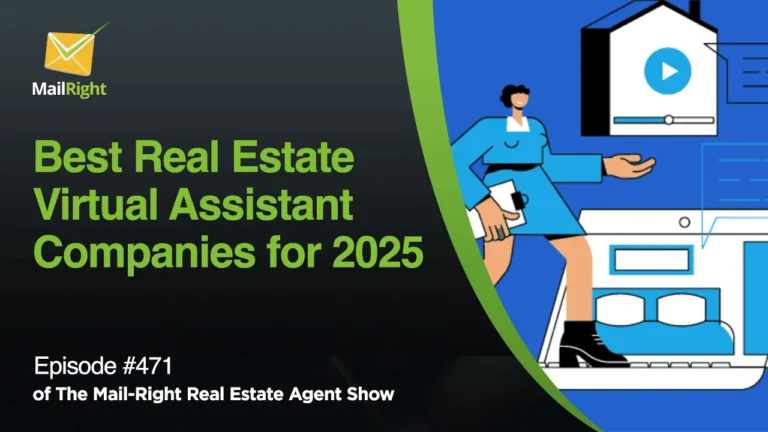On the 408th episode of Mail-Right Show, Jonathan Denwoon and Robert Newman discussed getting leads once Google My Business Profile is set up and shared advanced strategies for gaining ranking. Jonathan Denwood is the joint founder of Mail-Right, a paid agency that creates beautiful WordPress websites and utilizes Facebook and Google Local Adverts to get more leads. On the other hand, Robert Newman has been a real estate SEO expert for 15 years, has worked with major notable companies, and is also the founder and CEO of Inbound REM, which focuses on SEO as a service for real estate agents. This episode also explained how some things that connect to the ranking are also connected to lead conversion.
Part of the hyperlocal equation is connected to Google My Business Profile. Listings are now going to be the coin of the realm in digital marketing because of lawsuits happening with NAR, concerns that are happening in real estate, and Google’s increased dedication of time, energy, and effort to enhance hyperlocal ranking. With more searches directed to these profiles, customers are now recognizing, at a core level, the true importance of Google My Business Profile for business.
Why is Local SEO significant?
1. It Links Hardware with Software, and that’s Always the Strongest Sector.
Local SEO is significant because of the relationship between mobile devices and Google’s technology.
Local SEO was already a specialized field before the mobile phone, iPhone, and Android. However, Local SEO is being put on steroids with the iPhone and Android. If you have a smartphone and you’re searching for local services, Google essentially knows your approximate location. This is because mobile devices provide information about your whereabouts, allowing Google to tailor advertisements and provide relevant information based on your location.
2. An Optimized Local Profile Can Help Secure A Listing That Will Produce A Steady Commission Over Time
About 98% of realtors nationwide didn’t bother setting up a Google business profile in the real estate industry. This means that if you glance around your office, most people you see aren’t competing against you, nor trying. Considering that there are many licensed individuals, this represents a massive untapped audience.
Regarding profile optimization, only 2% of agents have taken the initiative to set up a profile. Of that small percentage, only 10% understand how to optimize it correctly. This brings us to a mere 0.01% of real estate agents who truly comprehend the value of a well-optimized Google business profile.
Advanced tools and services like LocalEasy, BrightLocal, and WhiteSpark specialize in optimizing local profiles, and they’re making significant strides in the real estate sector.
Furthermore, the real estate industry tends to lag about a decade behind other service industries, such as plumbers and contractors, which have embraced the potential of online marketing. For example, a plumbing company has a monthly marketing budget of $30,000 to $50,000. This company recognizes that investing $10,000 in their local profile generates substantial returns. Surprisingly, many real estate agents fail to grasp the importance of ranking high in local search results. Being in the top 1, 2, or 3 spots can translate into $200,000 to $300,000 in Gross Commission Income (GCI). This has a significant financial impact on realtors, who may not realize the potential of these online rankings.
In the current real estate landscape and the future, listings are gold. In almost every market, securing a listing translates to a steady commission over time, and it relies on your online profiles. The calls for listings and the ability to put them under contract are direct outcomes of a well-optimized local profile. Realtors must recognize that hyperlocal marketing is the most underserved, important, and easiest-to-win marketing opportunity in an era where listings hold immense value.
Advanced Strategies That Will Impact Your Hyperlocal Profile
1. Online Directories and Local Citations
In local SEO, a distinctive section sets it apart from broader categories like city, large metropolitan, regional, and national levels. This distinction lies in the significance of local directories, such as Yelp and Yellow Pages, making it stand out in the local SEO landscape.
While these directories might carry less weight in highly competitive regions like the Bay Area or New York, their relevance becomes more debatable in metropolitan settings. For most cities and areas, directories play a crucial role as one of the factors Google considers. It’s confirming that you’re a legit player and doing business in the area you’re stating when you set up your Google Business local page.
Utilizing the same email and phone number on these different directories is crucial. Google checks these details meticulously, expecting the exact information for each letter and digit across your directories. Any difference may trigger warning signals within the Google system. It’s important to note that having a personal website also plays a role in this verification process.
Moreover, online directories are extremely important in terms of ranking. But how do online directories, citations, and things like that impact the profile?
First, if you have a few directories with different addresses, for example, you also use a PO address, and somehow Google knows it was a PO address, you won’t get any ranking off that PO address. However, if you use your home address within 30 days, you will start to rank in local searches. If you change those PO box addresses and make them synonymous with your address, your ranking can shoot up and will continue to do so. A few common things about an address you should care about is what happens if your address is the same as a broker’s? You work out of an office and list yourself and 100 other agents from the same address. Can you compete? Yes, it’s harder, but you can.
Where you will epically fail is if you set up your home address and then list your business address in different places; you’ll never rank anywhere. So, you must choose an address and then use services like WhiteSpark, Inbound IDM, or somebody to clean up all your addresses. Find them, analyze them, and then change them so they all have the same address.
Today’s biggest directories are Zillow, Realtor.com, Bing, Yahoo, Google, Facebook, all the big fang companies, and Yelp. You must ensure you have the same information listed in all of them.
2. Google Properties and Tools
Google provides a whole more massive toolkit than most people realize. There’s a Google Maps profile, also called a local search guide, where you can be a local search guide or contribute reviews to other businesses. There are also Google business profile and YouTube, which are another Google profile, Google Plus, an image library profile, and an author profile.
Google has a number of its own properties, and it is mostly the Google Business profile. And there are some fundamental overlaps, like using images and incorporating your address. Another essential overlap is website operations. A website serves as a self-promotion tool, and many agents often overlook the importance of having their website. Having an active website is vital as it is part of the metrics of different factors that Google looks at. Active website involves engaging in relevant activities and ensuring the content resonates with the claimed geographical area on the Google Business profile.
Furthermore, one of the secrets to the ranking is ensuring that Google can read what you’re doing or understand your business. Search engines leverage websites to understand the nature of a business. It is imperative, especially when using platforms like WordPress, to use a consistent email address. When setting up your website, use a Google Gmail Address instead of a Yahoo email address if you want the WordPress website to be found through Google.
3. Create A Robost Online Ecosystem That Captures Attention From Various Platforms.
A YouTube channel under your email address and a Google Maps profile can boost your online presence in hyperlocal SEO. Connecting your local YouTube videos to a neighborhood page dedicated to a specific area is more unstoppable. The process is simple yet effective: your YouTube video, complete with latitude and longitude details, is complemented by images attached to the page using the same geographical coordinates. This combination sends a clear and unmistakable signal to Google, enhancing the visibility of your content.
The game-changer is the combination of traditional search volumes, YouTube search volumes, and image-like search volumes. It creates a robust online ecosystem that captures attention from various platforms, focusing specifically on the targeted neighborhood.
Your brand becomes synonymous with the area. By directing traffic to your website, you can guide visitors to specific pages, such as your profile page, where there’s a comprehensive biography and social proof, solidifying your status as a local expert, and that’s when you start to create a lot of marketing momentum to prove to somebody you are a local expert.
4. Create Local Focus Content
Your website content must have a high local knowledge or value element. That being said, local content can help you target local keywords, provide valuable information to your local audiences, and consider blog post videos or other content relevant to a specific area.
When it comes to local content, how will you get calls without force and registration? Well, conversion happens with social proof.
A well-crafted local page is the key to establishing credibility when doing hyper-local information. Whether you have a page that focuses on local properties, highlights popular restaurants, shares insightful blog posts, or presents successfully sold properties, you must have a specific neighborhood where you start with your social proof.
If you’re an experienced agent who’s done business in a particular area, prove it by showing the sold properties, as it gets people a lot closer to wanting to call you, especially if they see something similar to a property that they’re thinking of listing or thinking of buying. Make sure as well that you connect the page to your local reviews. Consider putting them on the same page dedicated to the neighborhood or creating specific reviews for individuals engaged in business within that locality.
Alternatively, you can have one page to put all your reviews on your website, preferably through a plugin or a link to an external profile. This is because self-published website reviews can be doubtful due to fake or outdated reviews. Recent reviews showcasing your current work are more likely to instill trust and prompt potential clients to reach out. External platforms such as Google Reviews, Zillow, and Facebook are preferred as they display dates and additional information, creating transparency in the recent reviews and helping build trust.
5. Encourage Customer Reviews
Reviews are the number one conversion factor that you are in control of. When you request a review, the worst thing you can do is tell your client to leave a review on your Google reviews channel and then leave it at that. You have a 1% chance they’ll remember and do it.
Instead, you can email them about a recent experience and express your gratitude for the opportunity to serve. Mention specific aspects of the transaction, such as favorite moments, and then add a personal touch. Then, politely request a favor and write about the positive impact of reviews on your business growth, along with a link to the preferred profile for the review.
But don’t stop there! Suggest sharing the unique details of the transaction and avoid direct copying. Highlighting key points, like the location, the property type, the approximate value, and the six-month journey to find the perfect home, adds depth to the customer experience. Tell them that if they can illustrate their customer journey with you, that would help your business the most.
Another thing to note is that even though you always ask people not to copy what you say, they always copy what you say. So, if you want to control what your profile says, you write it for them. Even if they don’t copy it word for word, they usually summarize what you said and then write it on your profile. Why does that matter so much? Because who, what, when, where, why, and how are what people are looking for when deciding. And these help tell so much about the realtor and their customer’s experience.





